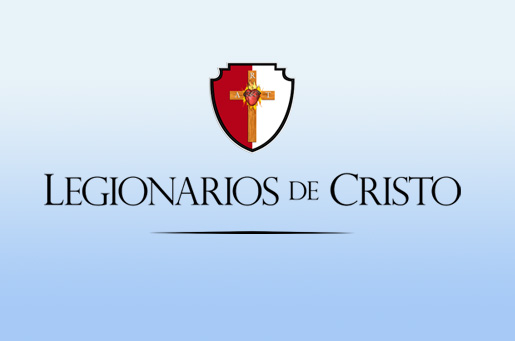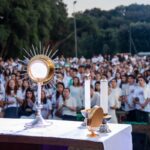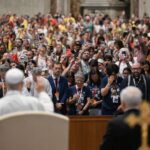(This text was approved at the plenary meeting of the General Chapter on January 20, 2014. We will publish it with the announcement of the new government).
1. The Extraordinary General Chapter, gathered in Rome under the presidency of the Pontifical Delegate, Card. Velasio De Paolis, issues this statement on the path of renewal we are undertaking. We address all those who have attentively followed the recent events in our religious congregation and especially our brothers, the Legionaries of Christ, the consecrated laity, the vowed members, and other members and friends of the Regnum Christi Movement.
2. This is the first meeting of the General Chapter since 2005. As the chapter is the highest internal authority representing the entire congregation, we have seen the need to speak out on the significant events of the past nine years. With this, we aim to definitively define our congregation’s stance on the behaviors of Fr. Marcial Maciel and his role as founder, in continuity with the dispositions of the Holy See and with the previous declaration of all the major superiors of the Legion of Christ. Additionally, we offer some initial reflections on the most important points of our congregation’s renewal process. In the coming weeks, the capitular fathers will continue analyzing the various issues we must address and will provide guidance to the new government of the Legion for the future path.
3. Reflecting on the gravity of the evil and scandal caused, we trust under the merciful gaze of God, who continues to guide our steps through His providence. United with Jesus Christ, we hope to redeem our painful history and overcome the consequences of evil with good. Only then can we find evangelical meaning in what happened and build our future on the solid foundations of trust in God, fidelity to the Church, and truth.
4. From this perspective, we have considered the gravest and objectively immoral behaviors of Fr. Maciel, which rightly warranted the sanctions imposed at the time by the Congregation for the Doctrine of the Faith. Our founder passed away in 2008, and we pray for God’s mercy for him. At the same time, we want to express our deep regret for the abuse of underage seminarians, immoral acts with adults, arbitrary use of authority and property, excessive consumption of addictive medications, and the presentation of writings published by third parties as his own. It is incomprehensible to us how he continued to present himself for decades as a priest and witness of the faith while hiding these immoral behaviors. We firmly condemn all of this. It pains us that many victims and affected persons have vainly awaited an apology and reconciliation from Fr. Maciel, and today we want to make it ourselves, expressing our solidarity with all of them.
5. The capitular fathers have listened to how the major superiors of the congregation have come to know these hidden aspects of our founder’s life, how they tried to discern the response to give, considering ethical and moral demands, and how they carried out the communication process. Along with them, we now recognize with sadness the initial inability to believe the testimonies of those who had been victims of Fr. Maciel, the long institutional silence, and later, the hesitations and errors of judgment in informing members of the congregation and others. We apologize for these deficiencies, which have increased the pain and disorientation of many.
6. Due to these facts and situations, our religious congregation could have disappeared if not for God’s mercy and the maternal solicitude of the Church, expressed through the decisive interventions of His Holiness Benedict XVI. The Pope considered that the Legion of Christ, in general terms, was a healthy community, but corrections were necessary. The assistance of the Holy See was essential to discover how the personality and mode of action of Fr. Maciel were affecting our religious congregation. In fact, the Apostolic Visitation—carried out, by the Pope’s mandate, between 2009 and 2010—confirmed that “the conduct of Fr. Marcial Maciel has caused serious consequences in the life and structure of the Legion, to the point of making a path of profound revision necessary.” The visitors highlighted three main areas: the redefinition of the charism, the exercise of authority, and proper formation. The Pope wanted to “accompany, support, and guide this path” through a delegate of His, “conferring upon him the task of governing in my [his] name such a Religious Institute during the time necessary to complete the renewal process and lead it to the celebration of an Extraordinary General Chapter, whose main purpose will be to complete the revision of the Constitutions.”
7. The capitular fathers listened to the reports of the Pontifical Delegate and our Pro-Director General on the work carried out over these three and a half years. We want to briefly share the analysis of some aspects related to what the Apostolic Visitation had detected and recommended. We know this is just the beginning of a journey and that much remains to be done. We are committed to continuing this process of renewal and conversion with humility.
a. In the field of revising our charism, the Pontifical Delegate has first guided us toward an adequate understanding of Fr. Maciel’s role in relation to the Legion. The congregation clarified in the past that it cannot propose Fr. Maciel as a model nor his personal writings as a guide for spiritual life. We recognize his status as founder. However, a religious congregation and its essential traits do not originate from the person of the founder; they are a gift from God that the Church accepts and approves, and which is then lived out in the institute and among its members.
An inadequate understanding of the concept of founder, excessive exaltation, and uncritical view of Fr. Maciel’s person often led us to attribute universal value to his directives and to cling too tightly to them. Therefore, in revising the current constitutions, one of the main tasks has been to distinguish what truly expresses the charismatic patrimony of our congregation from other incidental elements. We have also ensured that all our legal norms conform to the universal norms of the Church. The three years of the revision process have been akin to a prolonged communal examination of conscience to discover and purify behaviors that were not truly reflective of religious life. We have observed some tendencies that clouded the understanding of our charism, including, among others, a lack of greater integration into the local Church, an excessive emphasis on personal effort, human effectiveness, external prestige, and meticulous observance of norms. All this requires not only a change in legislative texts but a continuous conversion of mind and heart.
During these years, we have also gained a better understanding of our integration into the Regnum Christi Movement and have come to value and respect the vocation and autonomy of other members, especially consecrated men and women. Together with them, we have begun a joint reflection on the role of each branch of the Movement, on our common charism, and on how to carry out our apostolate. The numerous lay members of Regnum Christi are a beautiful part of our ecclesial reality, and we want to further foster communion and support it through our priestly ministry.
b. In the exercise of authority, the accompaniment of the Pontifical Delegate has been a continuous and effective lesson in putting into practice everything the Church indicates regarding the governance of institutes of religious life. We have sought to introduce a clear separation between the realm of conscience (spiritual direction and confession), the internal forum, and the external forum (the guidance of superiors and religious discipline) to better guarantee the freedom and privacy of each religious. With greater turnover of those holding various governance positions and with the accompaniment in exercising authority by a council that meets periodically and analyzes the most important matters, we try to prevent possible arbitrariness and abuses. The Pontifical Delegate and some of his personal advisors participated almost weekly in the general council meetings, sharing their knowledge and experience. The fragmentation of authority—due to the excessive multiplication of assistants and auxiliaries of superiors and their assigned competencies—has also been reduced. Formal consultations with congregation members before appointing superiors have been instituted, and in cases of community or apostolic mission changes, the involved person is engaged to better discern God’s will. Finally, thanks to the elimination of one of our two particular vows and numerous community meetings for reviewing the constitutional text, we are learning how to share and freely debate reflections and suggestions on any matter concerning the life and mission of the congregation.
c. In the formation of our religious, the need to improve vocational accompaniment has been especially evident, so that novices and religious can mature in their personal decision before God prior to making their religious profession. Reports have shown that in the last four years, quite a few priests and many of our brothers have left the congregation. In some cases, the negative impact related to news about the founder and how it was communicated was undoubtedly a factor, but we have also identified deficiencies in the formation program and our lifestyle. Among other things, we must foster a deeper living of the evangelical counsels, spiritual discernment, and fraternal life. Formation and religious life remain subjects of reflection for this Chapter and will be priorities for the next general government.
8. In the early days of the Chapter, we also heard reports from two commissions established by the Pontifical Delegate:
a. The “Approach Commission” attended to persons who requested action from the Legion of Christ due to events directly or indirectly related to Fr. Marcial Maciel. The commission’s president, Mons. Mario Marchesi, informed us about the twelve cases presented. The commission has completed its work, and no case under its jurisdiction remains open. The congregation has acted in each case according to the proposals of the commission. Listening to and providing material help to victims has contributed, as humanly possible, to alleviating their wounds and fostering reconciliation.
We thank all Legionaries for their effort to also reach out to other affected persons and to meet with them personally. We ask the new government to maintain this commitment to continue seeking reconciliation.
b. The “Commission for the Study and Review of the Financial Situation of the Legionaries of Christ” aimed to analyze the congregation’s financial management and situation. The report presented to the Chapter by Mons. Mario Marchesi, a member of the commission, emphasizes that no embezzlement or other irregularities were found in the reviewed fiscal years.
The urgent issue to address in this area is reducing the bank debt, which resulted from several factors: overly rapid expansion of the congregation’s works, the global real estate crisis, and the decline in donations. In some countries, the debt is substantial but still manageable with the congregation’s income and assets.
Furthermore, the Commission has highlighted the need—and this will be the task of the next general government—to adjust and simplify the administrative structure to promote responsibility among territorial superiors, local superiors, both branches of the consecrated members of Regnum Christi, and directors of apostolic works.
The General Chapter, as the supreme authority of the congregation, also had at its disposal the extensive and detailed documentation prepared by the general administrator and the reports of internal and external audits of the congregation’s financial operations worldwide.
9. The considerations of all these topics have led us to conclude that the path of “authentic and profound renewal,” confirmed by Pope Francis, has progressed but is not yet complete. The events of these years will shape the identity and life of our congregation. In the light of divine Providence, we can welcome, face, and transform them into a link for a new stage in our history. In the coming weeks, during the capitular meetings, we will complete the revision of our constitutions to submit them for the Holy See’s approval and will set priorities and guidelines to continue the path marked out by the Church with renewed hope, under the attentive care of the competent authorities.
10. We conclude this message with thanks to God for His merciful love, to the Church that has guided us through the person of the Successor of Peter, to His Eminence Cardinal Velasio De Paolis, and to his four personal advisors, His Excellency Mons. Brian Farrell LC, P. Gianfranco Ghirlanda SJ, Mons. Mario Marchesi, P. Agostino Montan CSI, for their firm and respectful presence among us.
At the same time, we thank all the Legionaries of Christ for their testimony of faith, dedication, and fraternal charity that unites us beyond all differences. Especially, we think of the senior priests who for many years have offered us an example of authenticity and dedication to the mission. We cannot “lose sight that their [our] vocation, born from Christ’s call and animated by the ideal of bearing witness to His love in the world, is an authentic gift from God, a treasure for the Church, the indestructible foundation upon which to build its future, both personal and that of the Legion.”
Finally, we thank the members of Regnum Christi and many others who have accompanied us over these years with their prayer and charity.
To all those brothers, religious and priests, who during this period left the congregation, we want to express our regret for no longer having them among us. We ask for sincere forgiveness if we have not listened to or accompanied them evangelically, and we wish to maintain friendship and fraternal dialogue.
We want to ask for forgiveness and reaffirm our effort for reconciliation with all who, in one way or another, were hurt by the sad events of these years and by our shortcomings.
Mary, Our Lady of Sorrows, was a witness to the redeeming power of Christ, who overcomes evil and sin. To her, our Mother, we entrust our future with great confidence.










